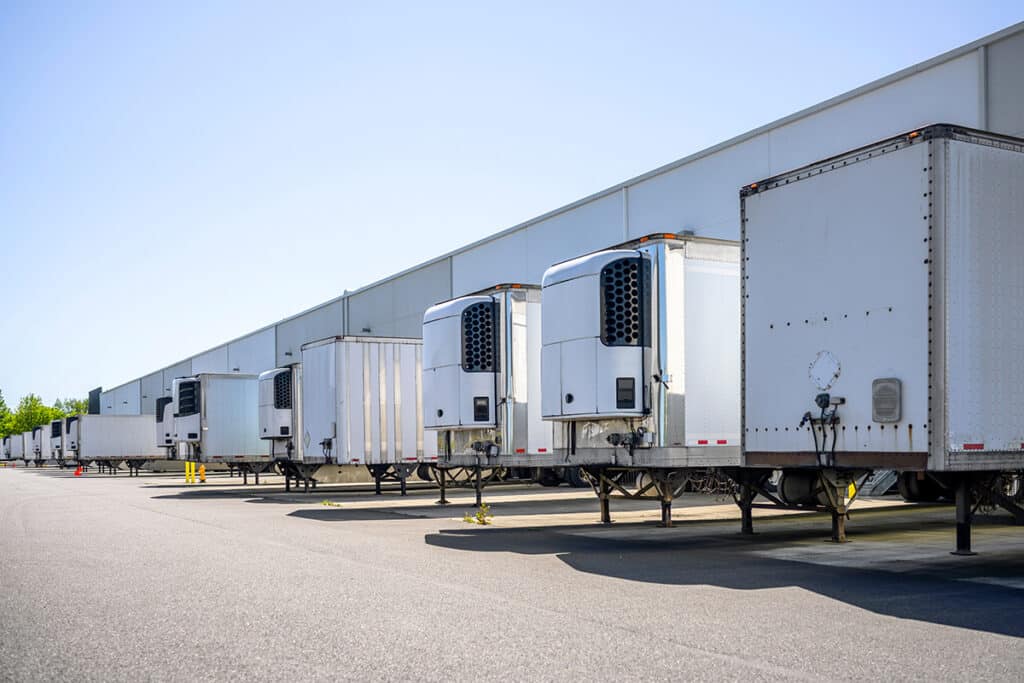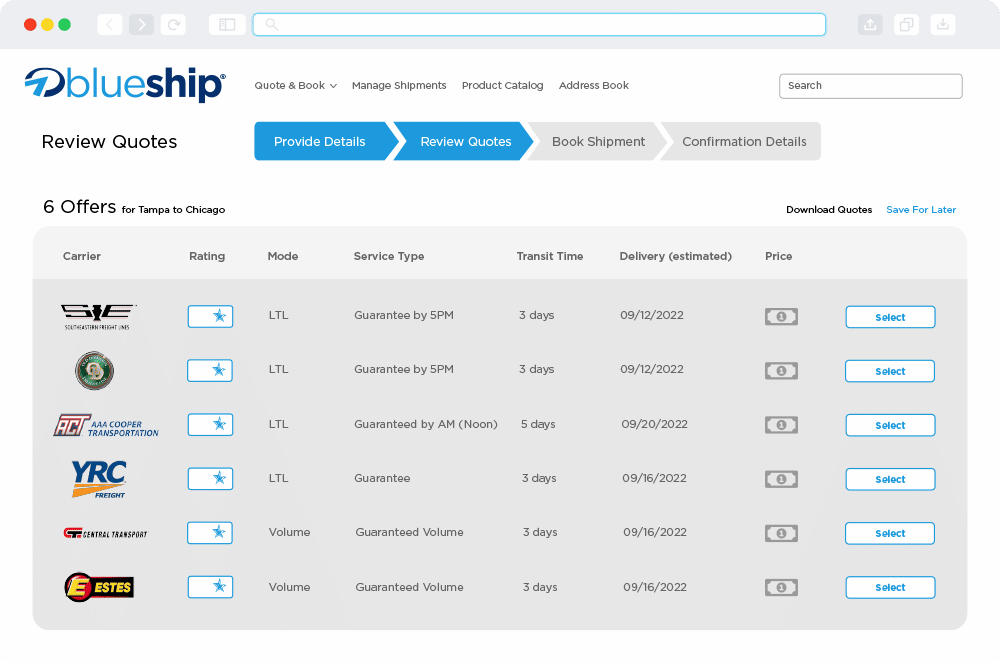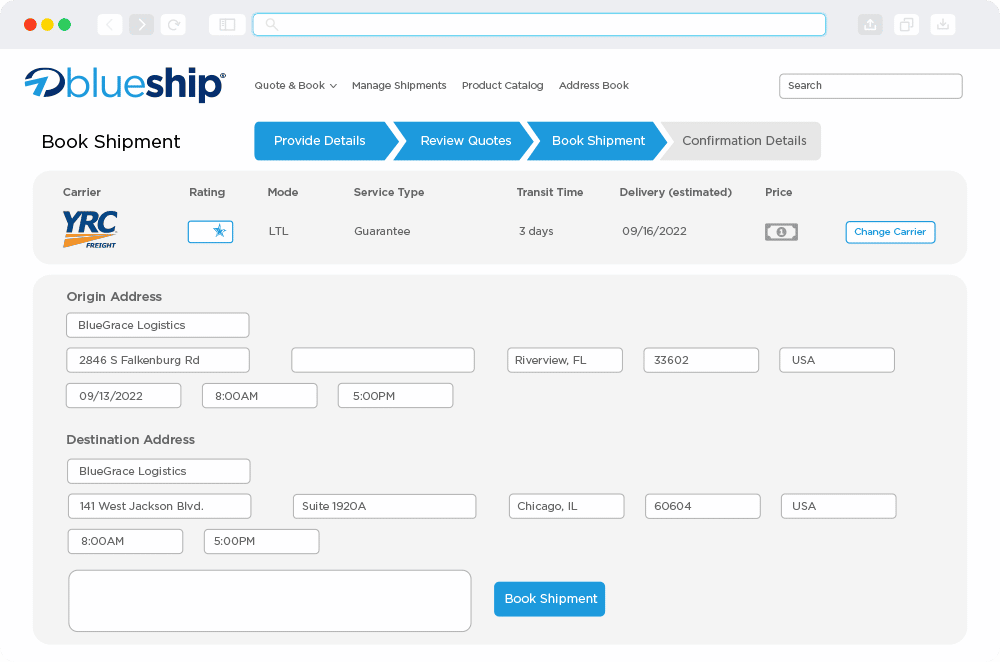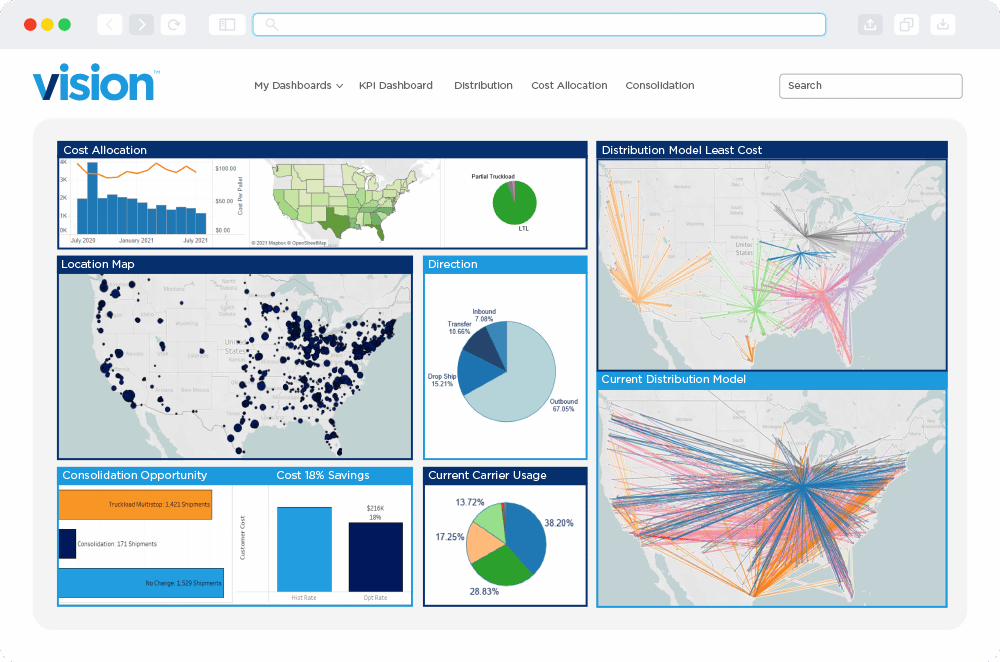
Reefer Trailers, Trucks and Containers: What's the Difference?

In the refrigerated transportation industry, ensuring the safe and timely delivery of temperature-sensitive goods is an ongoing challenge. Imagine a world where fresh produce, pharmaceuticals, and other perishable items could not reach their destinations in prime condition – it’s a scenario that would disrupt industries and affect consumers worldwide. To prevent this, the $13.8 billion market relies on the use of three key players to transport important freight: reefer trucks, reefer trailers, and reefer containers.
As a logistics professional, you understand that choosing the right transportation method can make all the difference in meeting your supply chain goals. But how do you choose between them? A Reefer truck, trailer, and container each have their unique strengths and purposes. But navigating the nuances of these options can be complex.
If you’re interested in learning more about reefer transportation, you’ve come to the right place. In this guide, we’ll explain the differences among refrigerated transportation equipment and give you key pointers to help you choose the right option for your needs.
Let’s get started!
Win Over Big Box Retailers: Get Your Free Shipping Operations Guide!
Option 1: Reefer Trucks
So, what is a reefer truck? We’ll start with the smallest of the three options. A reefer truck, short for “refrigerated truck,” is a specialized vehicle meticulously engineered to maintain precise temperature conditions inside its freight compartment. The exact opposite of a dry van, the purpose of a reefer truck is to transport temperature-sensitive goods, ensuring they reach their destinations in optimal condition.
Features
The key features of a reefer truck include:
- Integrated Refrigeration Unit: At the heart of a reefer truck lies its integrated refrigeration unit. This unit is responsible for cooling or heating the freight space as needed, ensuring that the temperature remains consistent throughout the journey.
- Insulated Cargo Compartment: The freight area of the truck is heavily insulated with air-tight doors, creating a barrier against external temperature fluctuations. This insulation is crucial for maintaining the desired temperature, even in extreme weather conditions.
- Temperature Monitoring: Integrating advanced temperature monitoring systems into reefer trucks provide real-time data on the internal temperature. These systems allow for precise control and ensure cargo remains within the required range.
- Efficient Air Circulation: Proper air circulation is essential for even temperature distribution. Reefer trucks facilitate efficient airflow, preventing hot or cold spots within the freight compartment.
Advantages
Because of their size and tight integration, reefer trucks are more maneuverable than reefer trailers or containers, making them:
- More Flexible: Reefer trucks are adaptable and can transport a wide variety of temperature-sensitive goods, from frozen foods to flowers.
- Quick Access to Freight: Their design allows for easy access to the freight area, making them easy to load and unload, especially for time-sensitive deliveries.
- Suitability for Urban Deliveries: Reefer trucks are ideal for urban deliveries and locations with limited space, thanks to their maneuverability and ability to navigate congested city streets.
Cases
Two cases where refrigerated trucks are particularly beneficial are in transporting:
- Fresh Produce Delivery: Reefer trucks are the go-to choice for fresh produce like fruits and vegetables. These goods are highly perishable and require immediate transport in a controlled environment to prevent spoilage.
- Pharmaceutical products: Pharmaceuticals often require strict temperature control to maintain efficacy. Reefer trucks meet these demands by providing the necessary temperature range to safely transport them.
Overall, reefer trucks will be an excellent choice for your business if you are moving smaller products through urban environments with tight streets. They may be less suitable for large products or large quantities that need to be moved over long distances.
Option 2: Reefer Trailers
What is a reefer trailer? Reefer trailers (short for refrigerated trailers) are an option that provides a larger freight capacity. Like reefer trucks, they feature built-in refrigeration systems. However, they don’t have their own engine and rely on a tractor truck to provide the necessary power.
Features
Reefer trailers possess several distinct features that set them apart:
- Mobility and Dependence: Reefer trailers are mobile units that require attachment to a tractor truck for movement. This arrangement provides the flexibility to connect different trailers to any compatible truck tractor, optimizing logistics operations.
- Larger Capacity: They offer greater freight capacities compared to reefer trucks. This increased space makes them suitable for longer hauls and the transportation of larger quantities of temperature-sensitive goods.
- Temperature Control Systems: Reefer trailers are also equipped with advanced temperature control systems. These systems ensure that the freight compartment maintains the required temperature throughout the journey.
Advantages
Several key advantages set reefer trailers apart from the other methods of transport:
- Longer Haul Capability: Reefer trailers excel in long-distance transportation, making them ideal for moving goods across state lines or for extended journeys where consistent temperature control is essential.
- Compatibility with Different Tractors: The modular nature of reefer trailers allows for compatibility with various tractor units. This interchangeability enhances flexibility and adaptability in logistics operations.
- Cost-Effectiveness: Reefer trailers can be a cost-effective choice for transporting larger quantities of goods compared to using multiple reefer trucks for the same task.
Cases
Two prominent cases where reefer trailers shine include:
- Interstate Transportation: Reefer trailers are well-suited for transporting frozen goods, perishables, or pharmaceuticals across state lines, even when they encounter extended distances and varying climate conditions.
- Supply Chain Logistics: They play a vital role in supply chain logistics, ensuring the efficient delivery of temperature-sensitive products to distribution centers or retail locations while maintaining product quality.
Overall, reefer trailers are an excellent choice for your business if you are transporting larger quantities of temperature-sensitive goods over long distances, making the suitable for interstate journeys and extended hauls. However, they may be less ideal for smaller loads or urban environments, where logistics professionals prefer the maneuverability of reefer trucks.
Option 3: Reefer Containers
What is a reefer container? The largest of the three options, the refrigerated container, plays a key role in international logistics, especially when it comes to transporting temperature-sensitive goods. These containers maintain a specific temperature range, making them ideal for transporting perishable goods such as fruits, vegetables or seafood across national borders and oceans.
Features
Reefer containers have unique features that set them apart, like:
- Intermodal Compatibility: Their compatibility with multiple transport modes. They offer versatility to businesses transporting goods across long distances, as they can transport via road, rail, or ocean. This also reduces freight handling, which helps to ensure that the goods remain intact and fresh.
- Advanced Temperature Monitoring: Reefer containers come with state-of-the-art temperature monitoring and control systems. These systems enable real-time adjustments, ensuring your goods remains within the required temperature range throughout the journey.
- Insulated Construction: Well-insulated walls and floors minimize temperature fluctuations within the container, providing a stable environment for sensitive freight.
Advantages
A few of the most significant advantages of refrigerated containers are:
- Global Reach: They can transport goods to virtually any part of the world, making them an indispensable tool for businesses that operate on a global scale. This ensures that businesses can reach new markets and customers, which can help to increase their revenue and profitability.
- Reduced Freight Handling: These containers minimize the need for freight handling during transshipment, reducing the risk of temperature fluctuations and preserving product quality.
- Precise Temperature Control: Reefer containers provide precise temperature control capabilities, assuring your goods remains at the desired temperature, even when facing varying environmental conditions.
Cases
When looking at specific use cases, you can consider a variety of situations. For example:
- International Food Exports: The seafood industry relies heavily on refrigerated containers to transport fish, shrimp, and other seafood products internationally. These containers help maintain the seafood’s temperature, ensuring that it remains fresh and safe for consumption during long ocean voyages.
- Pharmaceutical Cold Chains: Similarly, pharmaceutical companies use refrigerated containers to maintain the cold chain during international shipping. This ensures that medications or vaccines arrive at their destination in the same condition as when loaded onto the container, remaining safe and effective for patients.
Refrigerated containers are indispensable for businesses transporting temperature-sensitive goods across long distances. Their unique features, like compatibility with multiple transport modes, global reach, reduced handling, and precise temperature control, make them an ideal option for businesses that operate globally.
How to Choose the Right Option for Your Business
When faced with the choice between reefer trucks, trailers, or containers for your temperature-controlled shipping needs, several factors should guide your decision-making process. Understanding these considerations ensures that you select the most suitable option for your specific logistics needs. Here are a few factors to keep in mind:
1. Consider Your Freight and Distance
Before making a decision, it’s important to consider what you’re hauling and how far you need to haul it:
- For local deliveries of perishables or fresh produce to supermarkets, the distance and amount of freight involved may only necessitate a small reefer truck.
- When shipping large quantities of frozen goods across state lines and can’t risk any accidental thawing, it may make more sense to utilize a reefer trailer.
- When transporting refrigerated freight, like seafood, over long ocean journeys, it may be necessary to consider refrigerated containers.
2. Budget and Resources
When deciding between reefer trucks, trailers, or containers, it’s essential to consider your budget and the resources available to your logistics operation. Begin by assessing your financial constraints and the allocation of resources for transportation. Each option comes with its own cost structure, including upfront acquisition costs, ongoing maintenance, and operational expenses.
Reefer trailers and trucks may offer cost-effective solutions, especially for shorter routes and freight with lower volume. In contrast, reefer containers may be more suitable for long-distance or international shipments, provided your resources can accommodate them.
Additionally, consider the potential benefits of working with a third-party logistics provider (3PL). Collaborating with a 3PL can provide access to expertise and a broader range of transportation options, which can be particularly advantageous if you have budget constraints or limited in-house resources. They can also help tailor a logistics solution that aligns with your freight requirements and financial parameters, optimizing your transportation strategy.
3. Logistics and Accessibility
Your transportation network’s logistics and the accessibility of loading and unloading points are important to consider when choosing between reefer trucks, trailers, or containers. Analyze the structure of your transportation network and the specific routes your freight needs to navigate. If your network relies on road transportation with frequent stops, reefer trucks and trailers offer flexibility and accessibility. However, if your goods need to move across various modes of transportation or involves complex logistics, reefer containers may be a strategic choice.
Furthermore, evaluate the accessibility of loading and unloading points. Consider the nature of your freight and whether it requires specialized facilities or can be easily handled at standard points. Reefer trailers and trucks often provide greater accessibility for cargo handling compared to containers, especially in challenging or remote locations. Understanding the logistical intricacies and accessibility requirements ensures a seamless flow of your temperature-sensitive goods within your transportation network.
4. Environmental Impact
In an era where sustainability is a focus, it’s essential to factor in the environmental impact related to each transportation option.
- Reefer containers are typically designed with energy efficiency in mind, especially for long journeys, which can reduce emissions and energy consumption.
- A reefer trailer can also contribute to sustainability efforts through innovations such as solar panels. This innovative approach reduces emissions and lowers operational costs, making it a sustainable choice for temperature-controlled transport.
- Reefer trucks can adopt hybrid or electric reefer units. Hybrid units combine traditional diesel power with electric power, allowing them to switch to electric mode when parked or in low-load conditions, reducing emissions and fuel consumption. Electric reefer units, powered solely by electricity, produce zero emissions and are especially suitable for urban deliveries and shorter routes.
Explore sustainable transportation options that align with your business’s goals. By making environmentally conscious decisions and selecting transportation methods with eco-friendly features, you can contribute to a greener and more sustainable supply chain.
The Most Efficient Way to Manage Your Cold Chain Logistics
When it comes to refrigerated transportation, you’ve got three options: a reefer truck, a reefer trailer, and reefer container. Reefer trucks are small but highly flexible options that are well-suited for local deliveries in urban environments. Reefer trailers have larger freight capacity and are more fuel efficient for longer hauls. Finally, refrigerated containers are a shipping method crafted for extremely long distances, crossing national borders and oceans to deliver temperature-sensitive goods.
Choosing the right option among reefer trucks, trailers, and containers is not a one-size-fits-all decision. It requires careful consideration of your freight’s specific needs, your budget, the logistics of your transportation network, and your environmental impact goals.
This is where a trusted 3PL partner can be your invaluable asset. At BlueGrace, we understand the importance of informed decision-making in the world of reefer transportation. Our mission is is to empower logistics professionals like you with the knowledge and tools you need to succeed. If you find yourself in need of guidance, assistance, or simply a partner who can streamline your temperature-controlled shipping operations, we would love to help.
Related Posts
Inbound Logistics Programs for Retailers and Distributors During the Domestic Produce Season
Inbound Logistics Programs for Retailers and Distributors During the Domestic Produce Season
View Whitepaper
BlueGrace Logistics Named A 2023 Top 3PL And Cold Storage Provider
BlueGrace Logistics Named A 2023 Top 3PL And Cold Storage Provider
Read News
2022 Reefer Roundtable
2022 Reefer Roundtable
View Webinars






